Hyundai i30 Wagon vs Toyota Yaris Cross - Differences and prices compared
Costs and Efficiency:
Price and efficiency are key factors when choosing a car – and this is often where the real differences emerge.
Toyota Yaris Cross has a minimal advantage in terms of price – it starts at 23700 £, while the Hyundai i30 Wagon costs 24800 £. That’s a price difference of around 1157 £.
Fuel consumption also shows a difference: Toyota Yaris Cross manages with 4.50 L and is therefore clearly perceptible more efficient than the Hyundai i30 Wagon with 5.70 L. The difference is about 1.20 L per 100 km.
Engine and Performance:
Under the bonnet, it becomes clear which model is tuned for sportiness and which one takes the lead when you hit the accelerator.
When it comes to engine power, the Hyundai i30 Wagon has a slight edge – offering 140 HP compared to 130 HP. That’s roughly 10 HP more horsepower.
In acceleration from 0 to 100 km/h, the Hyundai i30 Wagon is barely noticeable quicker – completing the sprint in 9.80 s, while the Toyota Yaris Cross takes 10.70 s. That’s about 0.90 s faster.
In terms of top speed, the Hyundai i30 Wagon performs somewhat better – reaching 197 km/h, while the Toyota Yaris Cross tops out at 170 km/h. The difference is around 27 km/h.
Space and Everyday Use:
Cabin size, boot volume and payload all play a role in everyday practicality. Here, comfort and flexibility make the difference.
Seats: offers more seating capacity – vs .
In curb weight, Toyota Yaris Cross is somewhat lighter – 1180 kg compared to 1316 kg. The difference is around 136 kg.
In terms of boot space, the Hyundai i30 Wagon offers noticeable more room – 602 L compared to 397 L. That’s a difference of about 205 L.
In maximum load capacity, the Hyundai i30 Wagon performs clearly perceptible better – up to 1650 L, which is about 553 L more than the Toyota Yaris Cross.
When it comes to payload, Hyundai i30 Wagon slight takes the win – 524 kg compared to 510 kg. That’s a difference of about 14 kg.
Who comes out on top?
Overall, the Hyundai i30 Wagon shows itself to be wins the duel decisively and secures the title of DriveDuel Champion.
It convinces with the more balanced overall package and proves to be the more versatile choice for everyday use.
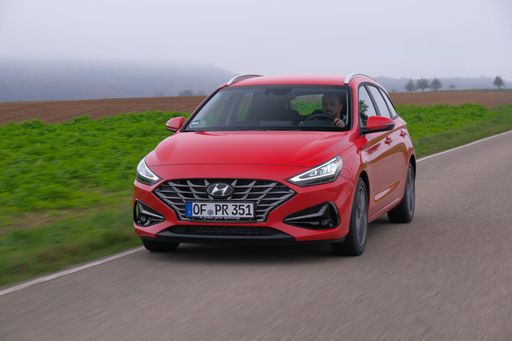 @ Hyundai Motor Company
@ Hyundai Motor Company
Hyundai i30 Wagon
Costs and Consumption
View detailed analysis
Engine and Performance
View detailed analysis
Dimensions and Body
View detailed analysis
Hyundai i30 Wagon
The Hyundai i30 Wagon is a practical family hauler that pairs roomy, sensible packaging with clean, modern lines and a surprisingly composed chassis. Comfortable, well-equipped and priced to make rivals sweat, it quietly ticks the boxes for daily life and weekend escapes while still managing a little grin on twisty roads.
details @ Hyundai Motor Company
@ Hyundai Motor Company
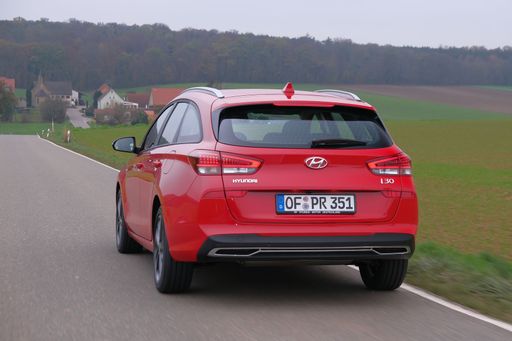 @ Hyundai Motor Company
@ Hyundai Motor Company
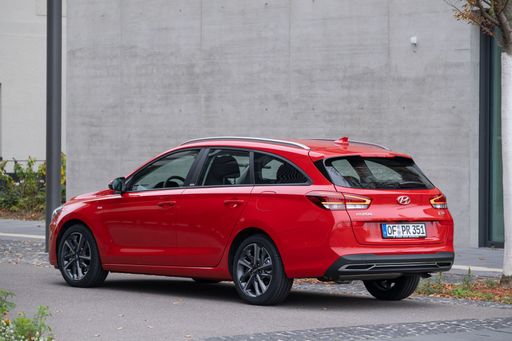 @ Hyundai Motor Company
@ Hyundai Motor Company
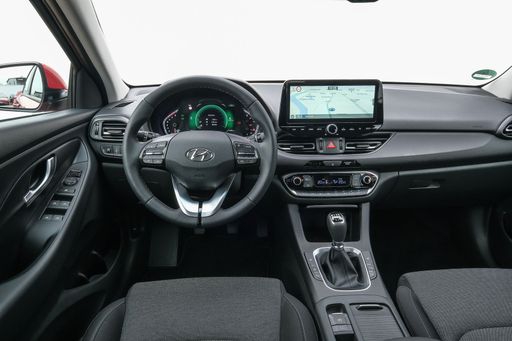 @ Hyundai Motor Company
@ Hyundai Motor Company
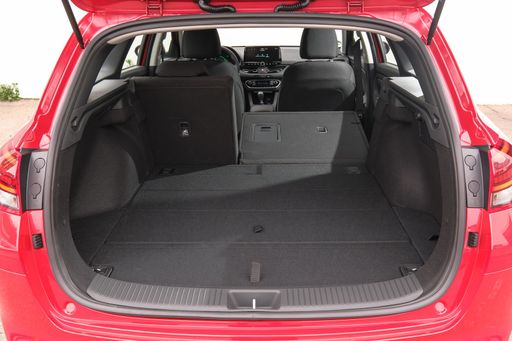 @ Hyundai Motor Company
@ Hyundai Motor Company
Toyota Yaris Cross
The Toyota Yaris Cross takes the jaunty personality of the Yaris and gives it a taller stance and a bit more practicality, so you get city-friendly agility with added SUV presence. It’s easy to live with, economical on the daily grind, and smartly packaged — a sensible pick for buyers who want fuss-free transport with a touch of character.
details @ Toyota Motor Corporation
@ Toyota Motor Corporation
 @ Toyota Motor Corporation
@ Toyota Motor Corporation
 @ Toyota Motor Corporation
@ Toyota Motor Corporation
 @ Toyota Motor Corporation
@ Toyota Motor Corporation
 @ Toyota Motor Corporation
@ Toyota Motor Corporation
 @ Toyota Motor Corporation
@ Toyota Motor Corporation
 @ Toyota Motor Corporation
@ Toyota Motor Corporation
 @ Hyundai Motor Company
@ Hyundai Motor Company
|
 @ Toyota Motor Corporation
@ Toyota Motor Corporation
|
|
|
|
Costs and Consumption |
|
|---|---|
|
Price
24800 - 30100 £
|
Price
23700 - 34300 £
|
|
Consumption L/100km
5.7 - 6 L
|
Consumption L/100km
4.5 - 4.8 L
|
|
Consumption kWh/100km
-
|
Consumption kWh/100km
-
|
|
Electric Range
-
|
Electric Range
-
|
|
Battery Capacity
-
|
Battery Capacity
-
|
|
co2
130 - 136 g/km
|
co2
101 - 108 g/km
|
|
Fuel tank capacity
50 L
|
Fuel tank capacity
36 L
|
Dimensions and Body |
|
|---|---|
|
Body Type
Estate
|
Body Type
SUV
|
|
Seats
5
|
Seats
5
|
|
Doors
5
|
Doors
5
|
|
Curb weight
1316 - 1461 kg
|
Curb weight
1180 - 1290 kg
|
|
Trunk capacity
602 L
|
Trunk capacity
320 - 397 L
|
|
Length
4585 mm
|
Length
4180 mm
|
|
Width
1795 mm
|
Width
1765 mm
|
|
Height
1475 mm
|
Height
1595 mm
|
|
Max trunk capacity
1650 L
|
Max trunk capacity
1097 L
|
|
Payload
439 - 524 kg
|
Payload
485 - 510 kg
|
Engine and Performance |
|
|---|---|
|
Engine Type
Petrol, Petrol MHEV
|
Engine Type
Full Hybrid
|
|
Transmission
Manuel, Automatic
|
Transmission
Automatic
|
|
Transmission Detail
Manual Gearbox, Dual-Clutch Automatic
|
Transmission Detail
CVT
|
|
Drive Type
Front-Wheel Drive
|
Drive Type
Front-Wheel Drive, All-Wheel Drive
|
|
Power HP
100 - 140 HP
|
Power HP
116 - 130 HP
|
|
Acceleration 0-100km/h
9.8 - 13.3 s
|
Acceleration 0-100km/h
10.7 - 11.3 s
|
|
Max Speed
178 - 197 km/h
|
Max Speed
170 km/h
|
|
Torque
172 - 253 Nm
|
Torque
-
|
|
Number of Cylinders
3 - 4
|
Number of Cylinders
3
|
|
Power kW
74 - 103 kW
|
Power kW
85 - 96 kW
|
|
Engine capacity
998 - 1482 cm3
|
Engine capacity
1490 cm3
|
General |
|
|---|---|
|
Model Year
2024
|
Model Year
2024 - 2025
|
|
CO2 Efficiency Class
D, E
|
CO2 Efficiency Class
C
|
|
Brand
Hyundai
|
Brand
Toyota
|
What drivetrain options does the Hyundai i30 Wagon have?
Available configurations include Front-Wheel Drive.
The prices and data displayed are estimates based on German list prices and may vary by country. This information is not legally binding.
